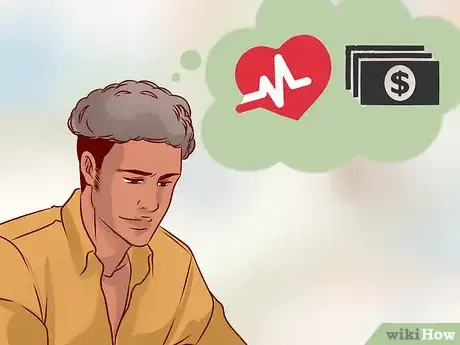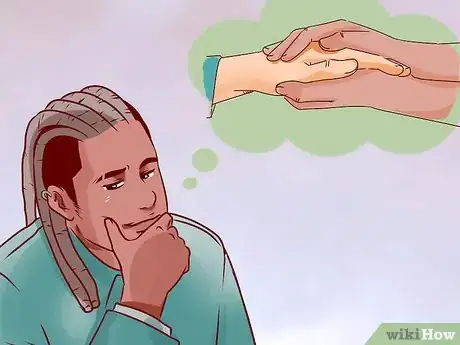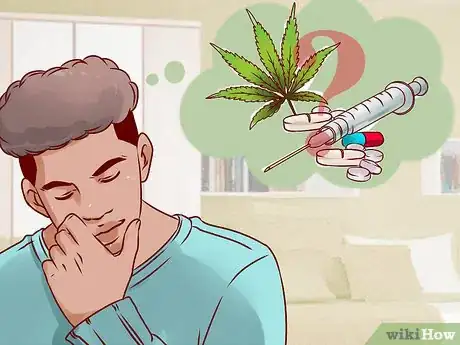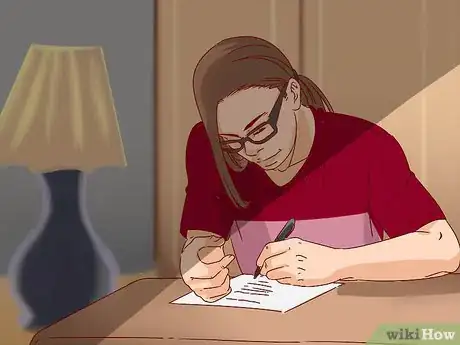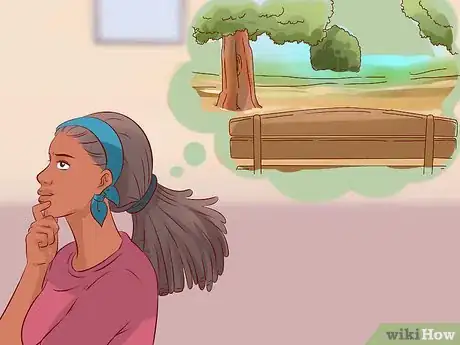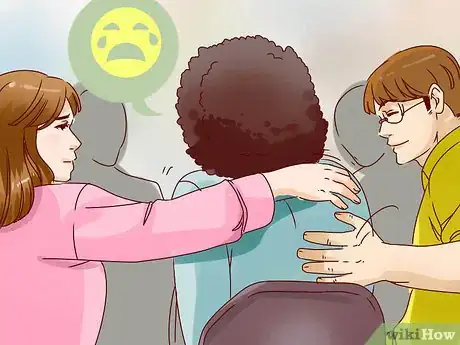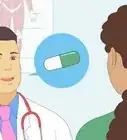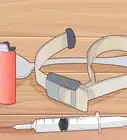This article was co-authored by Tiffany Douglass, MA. Tiffany Douglass is the Founder of Wellness Retreat Recovery Center, a JCAHO (Joint Commission on Accreditation of Healthcare Organizations) accredited drug and alcohol treatment program based in San Jose, California. She is also the Executive Director for Midland Tennessee at JourneyPure. She has over ten years of experience in substance abuse treatment and was appointed a Global Goodwill Ambassador in 2019 for her efforts in residential addiction treatment. Tiffany earned a BA in Psychology from Emory University in 2004 and an MA in Psychology with an emphasis on Organization Behavior and Program Evaluation from Claremont Graduate University in 2006.
This article has been viewed 20,847 times.
Being addicted to drugs can cause problems in your life, your partner’s life, and your relationship. If you are dealing with or recovering from a drug addiction, you need tell your partner. Being honest can help take a load off of you and hopefully provide you with a source of support. It also may make things easier and better in your relationship. Though telling your partner is a difficult endeavor, you can learn how to tell them so you can be more open in your relationship.
Steps
Deciding to Tell Your Partner
-
1Consider your motivation. Think about why you want to tell your partner about your addiction. One reason may be that you need support to help you with recovery. Recovering from a drug addiction is a difficult road. Having your partner provide support can make things easier for you.[1]
- Do you need your partner’s help staying sober? Has your drug addiction impacted your health, finances, or well-being?
-
2Realize that the relationship will change. Learning that you have a drug addiction may be hard for your partner to hear. It may change the way your partner views you. Though it may not necessarily be negative, they will now know this vital part of you. This means that your relationship will change because of this new knowledge.
- Your partner may feel hurt or distrustful of you at first. They may need to work through negative emotions as they come to terms with your situation.
- The relationship change does not need to be a negative thing. You and your partner may end up closer than ever due to this confession.
Advertisement -
3Decide if your partner is going to be supportive. As you prepare to tell your partner about your drug addiction, you should first be honest with yourself. Will your partner be supportive? This doesn’t mean they will support your drug habit, but support your recovery and your healing. This is important as you move forward with your life and your relationship.
- Ask yourself if you think your partner will be able to handle the fact that you have a drug addiction. Will they judge you and change their opinion about you? Will they support you as you continue through recovery?
-
4Determine how much you want to share. There may be a lot of information that goes along with your confession that you are a drug addict. You may not want to tell your partner everything at once. This may be overwhelming for both of you. Instead, decide what needs to be told at the beginning to let your partner know about your situation and your recovery.
- You may want to give basic details, like how long you used drugs and which drugs you used. You may want to save more specific details for later, once you have both moved forward and deepened the trust between the two of you.
-
5Prepare for any reaction. Though you love your partner and feel close enough to them to share your drug addiction, that doesn’t guarantee a positive reaction. Even if your partner loves you very much, they may still have a negative reaction. Be prepared for any reaction since this news can be an emotional and difficult thing to hear about someone they love.
- Be respectful of your partner’s feelings and reactions. This news affects them, too.
- Your partner may not be understanding or want to help you at first. Stay positive and patient with your partner as you continue to help them get used to this news.
Telling Your Partner About Your Drug Addiction
-
1Write down what you want say. Telling your partner about your drug addiction will more than likely be a very difficult conversation. To help prepare you for this conversation, prepare what you want to say ahead of time. Write down words, points, or sentences you want to make sure that you say. This can help you in the moment when you are nervous and may not be thinking clearly.[2]
- Try writing out a speech. You don’t have to read it, but thinking about what you want to say in its entirety may help you when you tell your partner.
- Make a list of bullet points with topics or points you want to make so you can make sure you cover everything during your conversation.
-
2Choose the proper time and place. To help make it easier when you tell your partner about your drug addiction, you should choose a proper time and place to do it. This means you should be in a private place where you won’t be interrupted. You should also do it at a time when you both have time to talk through the situation, even if that takes hours.[3]
- For example, don’t tell your partner when you only have a few minutes, when they are distracted, or when they have another engagement.
-
3Be honest about your addiction. When you are telling your partner, be open with them about what you are dealing with. This may mean you tell them about the drugs you’ve taken, ways it has negatively impacted your life, and what recovery measures you have taken. Don’t shy away from the truth or try to make things sound better than they are. You are sharing your situation to gain a better understanding from your partner, so be honest.
- You may want to tell your partner, "I am recovering from a cocaine addiction. This has impacted my life in a lot of ways. I have to be careful in certain situations because they may trigger me into wanting to use again."
-
4Listen to your partner. This conversation will not be one-sided. It will not just be you talking. Your partner should have the opportunity to talk also. They may have questions about your addiction and recovery, concerns about that it means for you and your relationship, or want clarification about things. Actively listen to what your partner says with an open mind.
- Take all of your partner's fears, concerns, and questions seriously. Try to understand where their questions and concerns are coming from.
-
5Detail your triggers. You may have a list of trigger situations, places, or people that you carry around with you. These triggers may put you into a position where you want to use again. Tell your partner what your triggers are so they can be aware of what may cause a relapse and help you avoid these things. Tell your partner what you do to avoid your triggers and manage them when you get into a risky situation.
- Tell your partner why these triggers affect you. Your partner will understand more about your addiction and you if they can see how you react to things.
- Say to your partner, “I know that you like going to clubs and bars, but that situation triggers me. I find that I want to use when I’m in that environment. Can we find other things to do?”
-
6Apologize to your partner. You may want to apologize to your partner for any harm or hurt you have caused. You may have hurt your partner at some point due to your drug addiction. Tell your partner that you know that your actions may have hurt them, or ask them how you have hurt them. Apologize for your behavior and any trust you have broken.
- Face all of the negative things you may have done because of your drug addiction. Going ahead and facing the pain and negative feelings can help you both move on and heal.
- You may say, "I’m sorry that my drug addiction caused you pain. I will try not to hurt you anymore in the future.”
Seeking Support
-
1Share your treatment plan. Tell your partner what treatment you are undergoing for your drug addiction. Letting your partner become part of your recovery process is very important. This not only lets your partner know that you are taking positive steps to heal, but lets them feel like they are part of your recovery. It helps them be able to support you when you need them to.[4]
- Your therapy may involve rehab or medication. You probably also have a combination of therapy, lifestyle changes, and support groups that you use to help you recover and manage your addiction.
- Say, "I have made a commitment to myself to recover from my drug addiction. These are the steps I am taking to recover."
-
2Suggest couples therapy. Your partner may not be supportive or comfortable with the idea at first. Even if your partner is supportive, you both may still need some support, therapy, and mediation. You may want to suggest that you go to couples therapy to work on your relationship. This can help you face and resolve any issues you may still have.
- Couples therapy may be needed if you’ve tried to fix things on your own but haven’t had much luck. You may benefit from a professional.
- Suggesting that you go to couples therapy can help demonstrate that you are dedicated to your relationship and your partner.
- Make sure that you and your partner both seek individual therapy as well. It is important for you both to have a safe space to discuss your thoughts and feelings about your recovery process.
-
3Help your partner find a support group. Your partner may need support just like you. They may need to learn how to support a recovering drug addict or ways to deal with things if there is a relapse. Your partner can also connect with others who have partners with a drug addiction and learn how they cope and support their partner. Many support groups are specifically geared towards families of those with a drug addiction.
- Support groups can also help your partner learn more about drug addiction and how they can help you cope.
- Support groups can also help them learn how to take care of themselves and their needs.
- At some point in your recovery, you may even want to expand your involvement in the support group to become an advocate. Advocating for the needs of people dealing with drug addiction can help you to feel empowered and continue in your recovery.
Expert Q&A
-
QuestionWhen do you tell your partner about a drug addiction?
 Tiffany Douglass, MATiffany Douglass is the Founder of Wellness Retreat Recovery Center, a JCAHO (Joint Commission on Accreditation of Healthcare Organizations) accredited drug and alcohol treatment program based in San Jose, California. She is also the Executive Director for Midland Tennessee at JourneyPure. She has over ten years of experience in substance abuse treatment and was appointed a Global Goodwill Ambassador in 2019 for her efforts in residential addiction treatment. Tiffany earned a BA in Psychology from Emory University in 2004 and an MA in Psychology with an emphasis on Organization Behavior and Program Evaluation from Claremont Graduate University in 2006.
Tiffany Douglass, MATiffany Douglass is the Founder of Wellness Retreat Recovery Center, a JCAHO (Joint Commission on Accreditation of Healthcare Organizations) accredited drug and alcohol treatment program based in San Jose, California. She is also the Executive Director for Midland Tennessee at JourneyPure. She has over ten years of experience in substance abuse treatment and was appointed a Global Goodwill Ambassador in 2019 for her efforts in residential addiction treatment. Tiffany earned a BA in Psychology from Emory University in 2004 and an MA in Psychology with an emphasis on Organization Behavior and Program Evaluation from Claremont Graduate University in 2006.
Founder, Wellness Retreat Recovery Center If you need to tell your partner about your substance abuse addiction, set up a time and place where you can have their full attention. You could even seek the help of a couples' therapist to help open the dialogue and make sure the conversation is productive for both parties.
If you need to tell your partner about your substance abuse addiction, set up a time and place where you can have their full attention. You could even seek the help of a couples' therapist to help open the dialogue and make sure the conversation is productive for both parties. -
QuestionCan a relationship survive addiction?
 Tiffany Douglass, MATiffany Douglass is the Founder of Wellness Retreat Recovery Center, a JCAHO (Joint Commission on Accreditation of Healthcare Organizations) accredited drug and alcohol treatment program based in San Jose, California. She is also the Executive Director for Midland Tennessee at JourneyPure. She has over ten years of experience in substance abuse treatment and was appointed a Global Goodwill Ambassador in 2019 for her efforts in residential addiction treatment. Tiffany earned a BA in Psychology from Emory University in 2004 and an MA in Psychology with an emphasis on Organization Behavior and Program Evaluation from Claremont Graduate University in 2006.
Tiffany Douglass, MATiffany Douglass is the Founder of Wellness Retreat Recovery Center, a JCAHO (Joint Commission on Accreditation of Healthcare Organizations) accredited drug and alcohol treatment program based in San Jose, California. She is also the Executive Director for Midland Tennessee at JourneyPure. She has over ten years of experience in substance abuse treatment and was appointed a Global Goodwill Ambassador in 2019 for her efforts in residential addiction treatment. Tiffany earned a BA in Psychology from Emory University in 2004 and an MA in Psychology with an emphasis on Organization Behavior and Program Evaluation from Claremont Graduate University in 2006.
Founder, Wellness Retreat Recovery Center Yes, it can. When you talk to your partner about an addiction, they'll feel a lot more at ease if you also have a plan to address that addiction. Have the details prepared, like whether you'll go to AA, therapy, or rehab, and whether insurance will cover your treatment. You might also suggest a family counseling component to help you learn to have a healthy, sober relationship.
Yes, it can. When you talk to your partner about an addiction, they'll feel a lot more at ease if you also have a plan to address that addiction. Have the details prepared, like whether you'll go to AA, therapy, or rehab, and whether insurance will cover your treatment. You might also suggest a family counseling component to help you learn to have a healthy, sober relationship.
References
- ↑ http://www.helpguide.org/articles/addiction/alcohol-addiction-treatment-and-self-help.htm
- ↑ http://psychcentral.com/blog/archives/2014/11/15/5-ways-to-prepare-for-a-difficult-conversation/
- ↑ https://www.psychologytoday.com/blog/fulfillment-any-age/201406/5-tips-tough-conversations-your-partner
- ↑ http://www.helpguide.org/articles/addiction/overcoming-drug-addiction.htm
